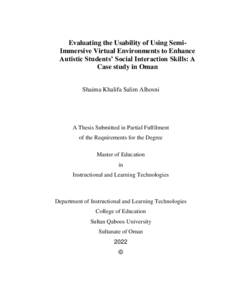Document
Evaluating the usability of using semi-immersive virtual environments to enhance autistic students' social interaction skills : a case study in Oman.
Other titles
تقييم إمكانية استخدام البيئات الافتراضية شبه الغامرة لتعزيز مهارات التفاعل الاجتماعي لدى الطلاب المصابين بالتوحد : دراسة حالة في عمان
Publisher
Sultan Qaboos University.
Gregorian
2022
Language
English
English abstract
Autism Spectrum Disorder is "a developmental disorder characterized by impaired
social interaction and communication as well as repetitive behaviors and restricted
interests". According to Zander (2004), autistic children mainly struggle with social
engagement, so they typically find it difficult to maintain eye contact, use body language,
and modulate their facial expressions or voice (Ramachandiran et al., 2015). Therefore,
helping children of this category to integrate and engage in social activities is an urgent
need for workers in the field of special education in general and specifically for those who
work with children with autism. This study investigated the usability of a semi-immersive
VR program in enhancing autistic students' social interaction skills and their ability to
transfer and generalize those skills to their real-life activities. The skills covered in this
research were verbal and non-verbal social interaction skills.
This qualitative case study research design used thematic analysis to deal with the
collected data to answer the research questions. The data was collected through semi structured interviews, surveys, and an observation checklist. The themes were determined
according to their value in answering the research questions.
The study's findings reflected a positive attitude from caregivers and parents
towards using the VR program. The high level of satisfaction with the VR program's
ability to enhance social interaction skills was clearly shown from the analysis of the
qualitative data collected from the study instruments based on the caregivers' and parents'
perspectives.
The results revealed that autistic students could more obviously transfer/generalize
the non-verbal interaction skills they learned in the VR program sessions than verbal
social interaction skills within their daily activities. The results also reported a strong
psychological impact of the VR program on students as they showed more relaxation and
motivation during and after the implementation. With the enormous number of
technological learning applications worldwide, this category of students deserves to
benefit from such technological advancements. Finally, the study presented some
implications, recommendations, and suggestions for future research.
Member of
Resource URL
Arabic abstract
اضطراب طيف التوحد هو "اضطراب في النمو يتميز بضعف التفاعل الاجتماعي والتواصل ا لـ (2004) Zander ، يعاني الاطفال بالاضافة إلى السلوكيات المتكررة والاهتمامات المقيدة". وفقً المصابون بالتوحد بشكل أساسي من عدم القدرة على مجاراة التواصل الاجتماعي ، لذلك يجدون عادةً صعوبة في الحفاظ على التواصل البصري ، واستخدام لغة الجسد ، وتعديل تعابير وجوههم أو أصواتهم )2015 .,al et Ramachandiran). لذلك، فإن مساعدة أطفال هذه الفئة على الاندماج والانخراط في الانشطة الاجتماعية هي حاجة ملحة للعاملين في مجال التربية الخاصة بشكل عام وخاصة ألولئك الذين يعملون مع الاطفال المصابين بالتوحد. بحثت هذه الدراسة في آثار برنامج الواقع الافتراضي شبه الغامر على تعزيز مهارات التفاعل الاجتماعي لدى الطلاب المصابين بالتوحد على مستويين، الاول هو تعزيز مهارات التفاعل الاجتماعي لدى الطلاب المصابين بالتوحد والثاني قدرة الطلاب المصابين بالتوحد على نقل هذه المهارات وتعميمها في واقع حياتهم اليومية. المهارات التي تمت تغطيتها في هذا البحث كانت مهارات التفاعل الاجتماعي اللفظية وغير اللفظية. استخدمت الباحثة التصميم النوعي لدراسة الحالة لمجموعة من الاطفال المصابين بالتوحد وقامت بالتحليل الموضوعي للتعامل مع البيانات التي تم جمعها لإلجابة على أسئلة البحث، تم جمع البيانات من خلال المقابلات الشبه المنظمة، والاستطلاعات، وقائمة مراجعة الملاحظة، تم تحديد المواضيع حسب قيمتها في إجابة أسئلة البحث. عكست نتائج الدراسة موقفًا إيجابيًا من مقدمي الرعاية وأولياء الامور تجاه استخدام برنامج الواقع ًء الافتراضي. بعد تحليل البي على وجهات نظر انات النوعية التي تم جمعها من أدوات الدراسة بنا مقدمي الرعاية وأولياء الامور إنعكس مستو ًى عالي من الرضا عن قدرة برنامج الواقع الافتراضي على تعزيز مهارات التفاعل الاجتماعي بوضوح. د َل على قدرة برنامج الواقع الافتراضي على تحصيل رضى المشاركين وتناسبه مع قدرات الطلاب المصابين بالتوحد، وإشراكهم في محتوى vii التعلم، مما يعكس بشكل أساسي قدرة برنامج الواقع الافتراضي على تعزيز مهارات التفاعل الاجتماعي. كشفت النتائج أن الطلاب المصابين بالتوحد يمكنهم بشكل أكثر وضوحا نقل / تعميم مهارات التفاعل غير اللفظي التي تعلموها في جلسات برنامج الواقع الافتراضي مقارنة مع مهارات التفاعل الاجتماعي اللفظي ضمن أنشطتهم اليومية. أشارت النتائج أي ًضا إلى وجود تأثير نفسي إيجابي قوي لبرنامج الواقع الافتراضي على الطلاب حيث أظهروا مزيدًا من الاسترخاء والحافزية أثناء وبعد تنفيذ الجلسات. مع العدد الهائل من تطبيقات التعلم التكنولوجي في جميع أنحاء العالم، تستحق هذه الفئة من قدمت الدراسة بعض الدلالات والتوصيات الطلاب الاستفادة من هذه التطورات التكنولوجية. أخيراً والاقتراحات لأبحاث مستقبلية.
Category
Theses and Dissertations

